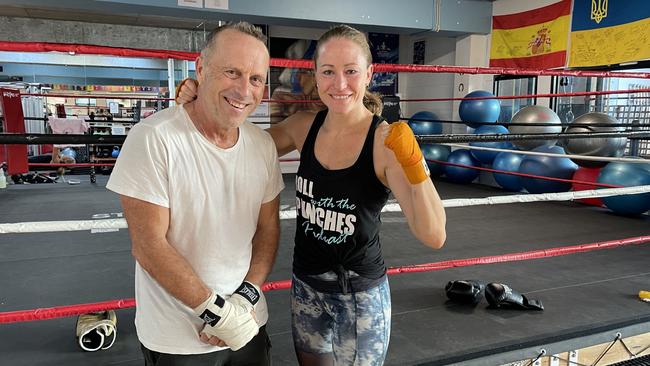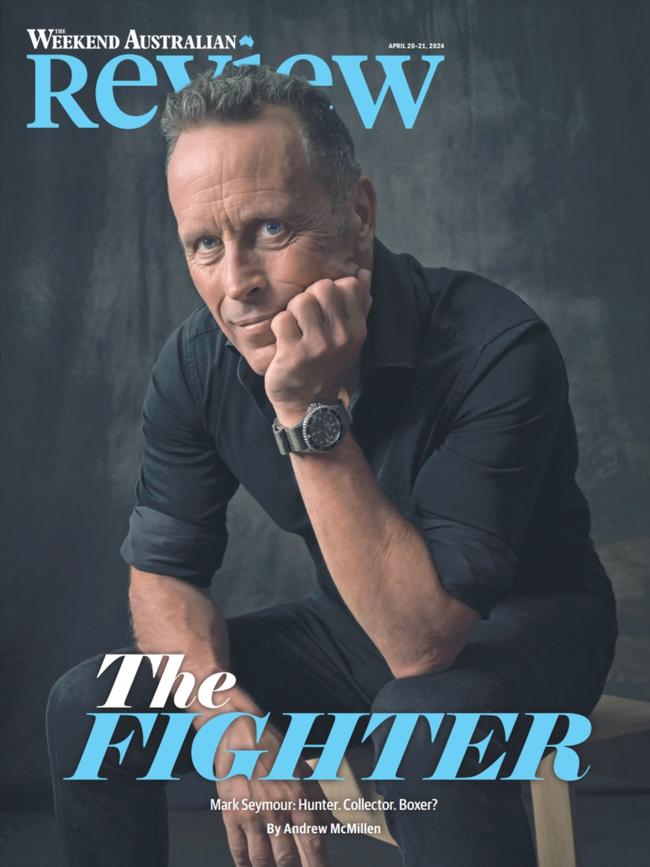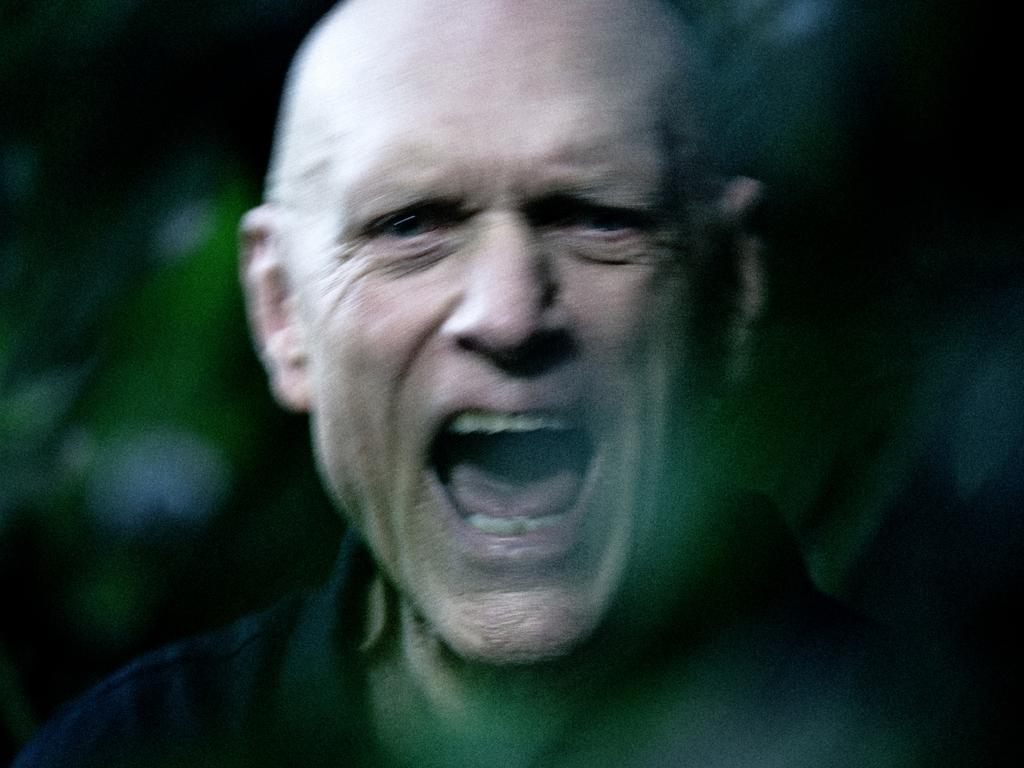Mark Seymour interview: Hunter, Collector, Boxer? On character and self-respect
When you’re invited to watch as one of Australia’s great rock ’n’ roll frontmen dons his gloves and steps into the squared circle, there’s only one feasible answer: yes. Always yes.

“Is this weird?” asks Mark Seymour, frowning.
His eyes are hidden behind sunglasses that protect against the sharp rays gradually cresting the horizon to warm the bitumen beneath our feet as we cross the road together, but the question betrays his uneasy feelings towards what’s about to take place.
It’s nine degrees outside on a morning so beautifully calm and still that hot air balloons are tempting fate by coasting close to tall buildings between Seymour’s home in Fitzroy and the sweaty locale in St Kilda where he tests himself regularly. Is it weird? Well, a little, in that he’s allowing Review to accompany him to observe an intimate activity that is usually done by two people stressing their bodies to maximum exertion without any spectators.
No, not that explicit act. That would not be at all fit for the pages of a family newspaper.
Journalism sometimes offers unusual situations like this one. When you’re invited to watch as one of Australia’s great rock ‘n’ roll frontmen punches on in a squared circle, there’s only one feasible answer: yes. Always yes.
“You’re not here for a punch in the face?” asks his boxing trainer, Tiffanee Cook, who sports a bright chirp and a cackle that belies the potential violence imminent from her fists. “It’s fun!”
It’s late March, and Seymour’s 11th solo album is a few weeks away from release. Recorded with his long-time band The Undertow, its title is not so much a hint as to why we’re both here as a gaudy neon sign that reads: The Boxer.
But there can be a beauty in the obvious, and this is an occasion where sheer novelty collides irresistibly with a desire to catch up on the life and times of the singer, songwriter and guitarist of the formidable – and now defunct – Melbourne-born band Hunters and Collectors.
His recent past contains a capsizing life change that roughly coincided with the decision to hang a bag in his garage, don gloves and learn to box, first via YouTube tutorials and later via in-person tuition, once Covid restrictions allowed such things.
We’ll come to that change a little later. For now, out the back of the St Kilda PCYC – past the treadmills, rowing machines and stationary bikes – Cook is leading Seymour through a somewhat curtailed demonstration of their usual training regimen.
At a Fitzroy pub the night before, he spoke frankly of his uncertainty around this malarkey of letting a writer tag along to his workout.
“There’s all sorts of shit I do in the gym that’s not particularly aesthetic,” he said, between sips of Carlton Draught. “A serious gym session is f..king full-on; I can barely walk when I come out. We’re going to do a little discreet thing, just a demonstration – and then we’re out.”
Still, there’s nothing half-arsed about what they’re doing together this morning, as she runs him through a ladder exercise aimed at training his footwork, then on to bag and pad work, before the pair of them eventually wrap their hands, add gloves and mouth guards, and square off in the ring.
She’s pulling her punches a little, but hitting hard enough to let him know when his guard is down. Intense focus shows on his face; he’s trying to hit her while blocking her blows, just as she’s trying to do the same, while occasionally offering commands to adjust his technique.
For those two-minute bursts of activity, everything else fades away but for the foe in the foreground. The song playing on the speaker system overhead as they spar is a late 1990s dance classic: Music Sounds Better With You by Stardust. After two rounds of their own one-on-one dance, Seymour leans over the top rope and looks down at Review. “I’m 67 years old – just reminding you,” he says, gassed.
“I hear that bullshit all the time; I don’t tolerate it,” Cook replies with a smile, in the time-honoured way of personal trainers worldwide, who are tasked with vanquishing excuses on the regular.
She’s the one on the album cover, looking fit, strong and formidable at 40, wearing red gloves, helmet and outfit, her muscles bulging. Theirs is an unlikely friendship forged in late 2020, when Cook first interviewed him for her podcast, Roll With the Punches, then later took him on as a pupil after she continually offered her services.

Asked what she’s noticed about Seymour in the time she’s been training him, Cook replies, “What I loved from the get-go is that he came in with both a real tenacity and determination – I love training people like that, who push themselves – but a real respect for understanding and articulating how the sport works, and what it means. I would give him instructions, and he would come back after practising it all week.”
As Seymour removes his gloves and begins a warm-down routine, his trainer looks across at him and reflects on how far he’s come in the few years they’ve known each other. “He’d come in here and talk about his age, and how his knees wouldn’t work; he had all these preconceived ideas about what was going to stop him – but that just falls away,” she says. “He comes in, he has a go, and he listens.
“Even the whole album that he’s written, there’s an undertone to it that I hope people who listen to it understand: that is life,” she says. “You can be 66, and learn things about yourself for the first time.”

The Boxer shares its name with the opening title track, a stirring three-minute pop song coloured by piano chords, palm-muted guitar notes and restrained drumming that blooms into a gorgeously melodic chorus wherein Seymour sings repeatedly in falsetto: “Little girl’s gotta do what a girl’s gotta do.”
Near the end, he sings: “Combinations kept on coming / If not for money then do it for love / She said, ‘I gotta roll with the punches / ‘Cos I got fighting in my blood’.”
In its music video, Cook is filmed training solo at the very same St Kilda PCYC where Review watched her spar with Seymour. Directed by Brian Purnell, it is a striking pairing of song with pictures; as its star, Cook is captivating, convincing and completely in the zone while playing the part of the titular boxer.
The lead single is something of a red herring, however. “The album isn’t actually about boxing,” says Seymour soon after sitting down with Review at the Napier Hotel in Fitzroy on a Thursday evening, before his morning session with Cook. “That was my idea; the album had another name. There is a metaphor in it: the idea that, when you’re in a bout, you’ve got to entirely depend on your own resources.
“That’s a really powerful idea,” he says. “It’s very rare in life that ever happens, and that definitely speaks quite loudly about what the record’s about – because I went through a massive life change.”
What happened was something both earth-shattering for the singer-songwriter, and commonplace at a societal level: his long-time marriage ended.
In his 2008 memoir Thirteen Tonne Theory, Seymour wrote of meeting Jo Vautier after a Hunters and Collectors gig in the early 1980s. “I’d bought her three tequilas and orange, merely because she’d kept looking at me with huge brown eyes,” he wrote. “In a rare moment of clarity I realised she wanted me.”
They repaired to his room at the Taree Inn, where, the next morning, she demonstrated a yoga pose called “salute to the sun” while nude. Seymour, painfully hungover, “lay there gazing at this girl’s arse rising and falling athletically … She was hard at it with not a care for the awful fact that I’d failed to deliver the goods only hours before. What a trooper.”
He and Vautier tied the knot in her homeland of New Zealand in 1994; they have two daughters together, Eva and Hannah, both now in their 20s. After 29 years, Vautier made the call to end it; they remain good friends.
“A lot of the events were beyond my control,” says Seymour at the pub. “My marriage probably was going to end at some point – but the pandemic brought it on, and that’s actually proved to be a statistical event in social history; it’s been documented that there’s a connection between the two things. At the time, I didn’t have any control over it – but there have been two or three moments in my life like that, and they’ve ended up being really quite useful from an artistic point of view.”
If you’re wondering whether there’s a song on the new album about that massive life change, the answer is yes. In the opening lines of third track She Burned Her Bridges Down, he sings in a resigned voice that captures the moment when Vautier made her wishes known to her husband:
One night she whispered
She spilled it in the dark
I never saw it coming
But it blew right through my heart
It sounded like an echo
She’d said it once before:
“Blow a kiss on leaving
and kindly close the door.”
That was in early 2022, and as he reeled from the ramifications of her decision, he happened to watch a 2017 documentary about the life of US writer Joan Didion. One line from her 1961 essay hit him like a Mack truck: “Character – the willingness to accept responsibility for one’s own life – is the source from which self-respect springs,” she wrote.

After returning with another round of Carlton Draughts, Seymour picks up the thread. “She made the point that strength of character is defined by your capacity to recognise mistakes, or judgment, or suffering – and you move on,” he says. “You absorb the experience and you pick yourself up and go, ‘Right – next thing’. I really took that on board.
“I just think self-pity is as common as anything,” he says. “People live their lives around self-pity. I’m very close to people who use the cloak of victimhood in how they relate to other people. It’s what I refer to as being a ‘professional victim’. I really abhor that; I really react against that. I think it’s cowardly.
“I’m really old-school when it comes to this stuff: your identity is defined by your experience, and you can’t ever relinquish that,” he says. “You just are who you are, and what you’ve done. Getting back to what Joan Didion said: character is in how you actually react to what you’ve done.”
After listing the former pair’s Mornington Peninsula home for sale in mid-2022, Seymour moved to Fitzroy, closer to the inner-city pubs where his old band were once seen as kings who laid audiences to waste.
By the way, that book mentioned earlier – Thirteen Tonne Theory, subtitled Life Inside Hunters and Collectors? It’s well worth tracking down. The 2008 title is a must-read for anyone fascinated by the inner workings of being in a band, just as The Beatles: Get Back docuseries is a must-see for the same reasons: because of the unvarnished honesty on display, and the passage of time accurately captured in both artefacts.
In his review for The Monthly, fellow singer-songwriter Robert Forster observed: “Anyone who comes after him to write of their years and careers in rock music must know that this is the book they are going to have to trump.” He’s right: across nearly 400 pages, Seymour combines a dry, caustic wit with a fine eye for both detail and dialogue as he reflects on “the most democratic rock band that ever went off”, as he describes it in the prologue.
“Just like its music, the story of Hunters and Collectors is a hard sell,” he writes. “It’s about a rock band with no image. Hunters and Collectors was the great misfit outfit of the 80s; it became the most successful pub band in Australian music history virtually by stealth, through mind-numbing repetition. Despite an almost terminal inability to exploit media attention, the band survived 18 years of wildly fluctuating chart success, poor to middling record sales, reviews that were everything from absurdly sycophantic to downright savage, and crowd sizes that ranged from two to 70,000.”
Its initial run from 1981 to 1998 – plus a few more recent, and brief, live reunions – is now legendary in Australian rock ‘n’ roll. Its songs have been etched into the national psyche via constant radio airplay: among them, Holy Grail, Do You See What I See?, When the River Runs Dry and True Tears of Joy, as well as the much-loved Throw Your Arms Around Me, which stadium-filling British pop artist Ed Sheeran covered at a Melbourne Cricket Ground concert last year in tribute to their mutual friend, the late Michael Gudinski.
Seymour was among the crowd of about 108,000 that night; he watched on, awe-struck by how far his most famous song had travelled since its release in 1984. “Can’t find the words to describe how I feel about this,” he wrote on Instagram when sharing footage of that extraordinary moment. “I’m humbled. That’ll do.”
But that band is firmly in the past, and the door is shut. Since 2011, Seymour’s musical home has been The Undertow, a quartet completed by Cameron McKenzie (guitar), Peter Maslen (drums) and John Favaro (bass), with Cameron Bruce playing keys on The Boxer.
The 11 songs on the new album – the fifth to be credited to Mark Seymour and The Undertow – came from jam sessions: unusually, the band members arrived at Woodstock Studios in East St Kilda with no demos, no pre-production, and some songs were written on the spot, in the room.

It’s a measure of their creative simpatico and inherent trust that this deeply personal album was forged in a fire of friendship, even as Seymour recovered from the burn of his separation.
“The theme of the record – there’s a whole lot of songs in there that really go to the notion of being in midlife and having this enormous emotional change take place,” he says. “Some of them are really sad; some of them are really positive and joyful. That song The Boxer sits somewhere in the midst of all of that.”
One of the most beautiful moments on the album is Waiting On the Kid, a co-write with Linda Bull — one half of the great sister act Vika & Linda — about the loving parental act described in the title.
Built on a waltz-like feel of strummed acoustic guitar chords, Seymour and Bull trade verses from their perspectives as father and mother, respectively, before blending together in the final verses: “My little shadow, she follows me / Across the world and over the sea / So I’m standin’ on the corner in the rain / Waitin’ on the kid.”
In its gorgeous music video – also directed by Brian Purnell – Seymour sings and strums, while Bull and her daughter Kiki dance together on a Fitzroy rooftop at sunset, Melbourne city skyline in the distance, smiling at one another. A more perfect illustration of familial pride and joy you’ll struggle to find.
In the midsection of She Burned Her Bridges Down, which chronicled the end of his marriage, Seymour sang: “Is there somebody out there who can meet you halfway? / Too many questions, you might drive them away … ”
He now lives alone in a Fitzroy apartment, but he’s not lonely. Is there somebody out there who can meet him halfway? There is, but her identity is a secret. They’ve made an arrangement to keep the relationship private, for now at least.
The last track on The Boxer is not his: it was penned by John Prine, the late, great American singer-songwriter. When Seymour was courting his new love, they were listening to a lot of Prine’s music together, so he decided to surprise her by enlisting his band to cover one of those songs – a sentimental, humorous ode to a lover and their character. When she heard his take on it, she was thrilled to bits.
Its title? She is My Everything.
The Boxer is out now via Bloodlines/Mushroom. Mark Seymour and The Undertow’s 17-date national tour continues at Brunswick Ballroom (Sunday, April 21) and ends at the Corner Hotel, Melbourne (June 8). The writer travelled to Melbourne as a guest of Mushroom Group.






To join the conversation, please log in. Don't have an account? Register
Join the conversation, you are commenting as Logout